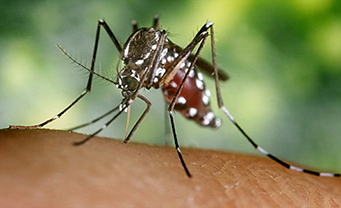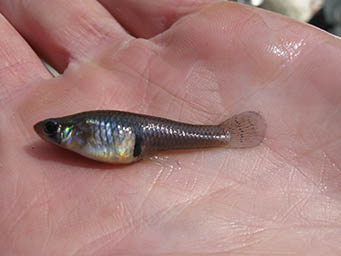| |
6 tips to reduce nuisance mosquitoes & disease in your community
| |

Asian Tiger Mosquito

Mosquito fish - Images courtesy of Solitude Lake Management |
| |
|
Summer is typically the time when communities, associations and property owners get the most out of their lakes, ponds and wetland ecosystems, but pesky mosquitoes can interrupt recreational activities and overall enjoyment of the outdoors. In addition to being a nuisance, mosquitoes can carry debilitating diseases, including Zika and Eastern Equine Encephalitis, as well as West Nile Virus, which is the most widespread and deadly, reported in 47 states and claiming more than 100 lives last year. Though mainstream media attention has shifted away from mosquito-borne diseases since the Zika scare of 2015-16, these viruses are still transmitted throughout the country.
"Mosquitoes are a threat to our communities in many ways” SOLitude Lake Management’s President Marc Bellaud said. “It’s critical for municipalities, landowners and associations to understand and implement preventative management strategies that are effective and well as safe for residents and the environment.”
To protect community members and limit mosquitoes around your waterbody this summer, SOLitude Lake Management recommends the following preventative tips:
Limit mosquito-friendly habitats
Female mosquitoes can lay about 300 eggs during their 6- to 8-week lifespan. Because mosquitoes tend to lay eggs in standing water, it’s important to clean out gutters, pick up garbage, and empty outdoor containers or buckets that can capture water. These efforts will help decrease the number of breeding grounds suitable for mosquito reproduction.
Circulate stagnant water
Aeration in lakes and stormwater ponds can do more than reduce bad odors and improve stagnant conditions; it can make a waterbody less appealing to breeding mosquitoes, who’s eggs require still water to complete their lifecycle. A floating fountain or submersed diffused aeration system can add continuous movement to stagnant waterbodies.
Remove nuisance plants
Stagnant inlets in lakes and ponds are attractive to mosquitoes for breeding purposes, but can be better circulated when nuisance and invasive plants are removed. Cattails and phragmites are common plants responsible for creating stagnant water conditions. A professional lake manager can recommend effective removal methods based on the time of year and species present.
Stock fish that feed on mosquito larvae
Another affordable and natural solution to reduce mosquito reproduction is strategic fish stocking. Fathead minnows, mosquitofish and bluegill feed on mosquito larvae, making them great candidates for mosquito control. Check with an experienced Fisheries Biologist about your state’s specific stocking regulations.
Attract dragonflies with native plants
Another mosquito predator is the dragonfly, which can feed on hundreds of larvae and full-grown mosquitoes each day. Consider planting beneficial buffer species like blue flag iris, pickerelweed, arrowhead, spatterdock, lizard’s tail and native grasses to attract predator dragonflies to the area. These plants will also help deter nuisance wildlife and prevent trash from flowing in to the lake or pond.
Integrate sustainable biological larvicides
Natural and preventative methods can make an enormous difference, but disease-carrying populations may still have a presence in your area throughout the summer. A more impactful approach is the professional application of a safe EPA-approved biological larvicide formulated from beneficial bacteria. When utilized as part of an Integrated Mosquito Management program, mosquitoes are targeted through each phase of their lifecycle, contributing to long-term prevention.
Mosquitoes are an annoying and dangerous pest, but efforts to reduce their populations are not futile. In addition to implementing strategies that reduce mosquitoes around freshwater ecosystems, it’s critically important to take steps to protect yourself and your family. When enjoying the outdoors, it should always be top of mind to use mosquito repellent sprays or wear protective clothing, when possible. Natural and professional prevention methods can help protect communities throughout the year without negatively impacting the environment—so you get full enjoyment from your waterbody all summer long. Contact your professional lake or pond manager to learn more.
SOLitude Lake Management is a nationwide environmental firm committed to providing sustainable solutions that improve water quality, enhance beauty, preserve natural resources and reduce our environmental footprint. SOLitude’s team of aquatic resource management professionals specializes in the development and execution of customized lake, stormwater pond, wetland and fisheries management programs that include water quality testing and restoration, nutrient remediation, algae and aquatic weed control, installation and maintenance of fountains and aeration systems, bathymetry, mechanical harvesting and hydro-raking, lake vegetation studies, biological assessments, habitat evaluations, and invasive species management. Services and educational resources are available to clients nationwide, including homeowners associations, multi-family and apartment communities, golf courses, commercial developments, ranches, private landowners, reservoirs, recreational and public lakes, municipalities, drinking water authorities, parks, and state and federal agencies. SOLitude Lake Management is a proud member of the Rentokil Steritech family of companies in North America. Learn more about services and purchase products at www.solitudelakemanagement.com.
Published July 8, 2018 |

